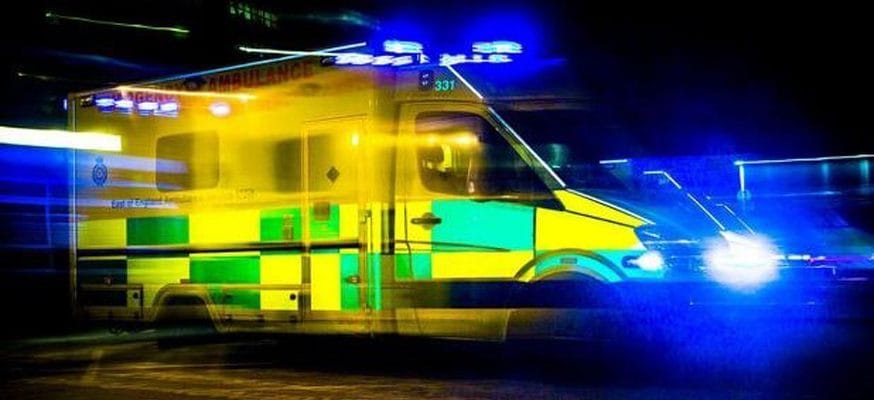
A rather tongue-in-cheek short story with a serious message. Why do people do it? It’s nuts.
The very last thing that Martin ever saw on this earth was a man’s face with a mobile phone clamped to its ear. The face was laughing fit to bust, tipped back with its mouth wide open to the day. Which is probably why he didn’t see Martin’s Mini Cooper coming round the bend in the narrow, cow parsley bordered lane. And which also is probably why the man on the phone didn’t even attempt to brake and why the fourteen ton, fully loaded milk lorry was still doing forty miles an hour when it ploughed into and over the little car.
Martin was, of course, killed instantly. He didn’t really feel anything, at least he couldn’t ever remember feeling anything. It was all over in a split second. He came round the bend, saw the great white lorry approaching and braked, fully expecting the lorry to do the same before requiring him to reverse back to the nearest passing place. But it didn’t brake, it kept on coming, even seeming to accelerate across the last few yards before impact.
Martin’s immediate incredulity was eclipsed by his crystal clear view of the laughing, phoning driver, one hand resting lightly on the top rim of the lorry’s steering wheel. Of course it was only a snapshot image because it can only have lasted a fraction of a second before Martin’s eyes were slammed shut forever, but ever since it happened, all he had to do was shut his eyes and he could see every detail, including the registration number of the lorry.
The driver of the lorry was shocked and bruised, nothing that a fortnight off work and some late night sessions down at his local couldn’t put right. He used to get quite a laugh out of his milk lorry one, Mini nil, story. You should have seen it, he was fond of saying, they needed a can opener to get him out. Ha, ha ha. Another round lads?
Martin has never been able to remember much about the first few minutes after his untimely and violent demise. He can vaguely recall a sort of aerial view of the crash scene with people in fluorescent yellow jackets milling about. He can also just about remember seeing the driver sitting in the cow parsley in the sun. He used his mobile phone to call for the emergency services, how ironic. Then everything became a little strange, with lots of bright light and quiet voices telling him not to worry, that everything would be alright. He must have slept, though for how long he would never be able to guess, because when he woke everything seemed much clearer. He lay wherever he was and took stock.
Of the fact that he was dead, there could be no doubt. He had, after all, seen the wreckage. They would have been lucky to pull out anything recognisable let alone salvageable. As to where he had ended up, he had no idea and to be honest wasn’t too worried. It certainly wasn’t hot, which was reassuring.
In fact, limbo or heaven or nirvana or wherever else Martin found himself residing after his death proved delightfully comfortable and undemanding after the many and various rigours associated with living on earth. And though he never actually gave it much thought, the complete absence of any form of bodily functions turned out to be surprisingly liberating. No hunger, therefore no eating; no tiredness, therefore no sleeping. Nothing hurt, he was neither too hot nor too cold and it was delightfully quiet. If he thought about people, there were people; if he thought about trees, there were trees. It was, he thought to himself, completely delightful. Except for one thing. He couldn’t get the image of the phoning driver out of his head.
After a while, it began to irritate him. And that in itself was annoying, the prospect of being irritated for the rest of his death. So he sort of asked for help. He didn’t exactly ask, he just thought, I could do with some help on this one and, the next thing he knew, he was talking it through with someone. It didn’t seem to matter who.
He was shocked at first when the word revenge cropped up. After all, it wasn’t the sort of word or attitude that one normally associated with the afterlife. But he had to confess that it did sound rather appealing. But how? he wondered.
He didn’t know the driver’s name or address of course. He didn’t even know the name of the dairy or the transport company. Ah, yes, of course. The registration number of the lorry. He remembered that all right. Tracking down the driver’s mobile phone number proved devastatingly easy. It seemed that that kind of thing was well catered for in that place.
But what to do? Call the man, say hello, I’m the chap you killed a couple of weeks ago, I really think you should think twice about using your phone when driving. Well, yes, in a way that was precisely what was suggested, but with a subtle refinement. It seemed that it wouldn’t be quite enough just to call him up at any time of the day or night, the timing of the call was critical.
7.47 am prompt, next Wednesday morning. That was the time he was told. Call him precisely then for maximum impact. It seemed that haunting was a far more precise science than he had ever imagined. He spent the next few days quite looking forward to his little bit of fun.
The lorry was lying on its back at the bottom of the gorge. The dead driver was in a crumpled heap almost submerged in a widening pool of rather muddy coloured milk, his mobile still clamped to the side of his blood soaked head. The crash investigators didn’t really need to check the phone company’s logs to ascertain the reason why the lorry hadn’t make it round that particular bend on that particular Wednesday morning, but they did, just to be sure. What was puzzling was that, although the line was open, and the company had a record of an incoming call, they could find no trace of the originating number. After a while they put it down to a technical glitch, and anyway, did it really matter? The man had been using his phone while driving. How very foolish.
© David Hermelin 2016


